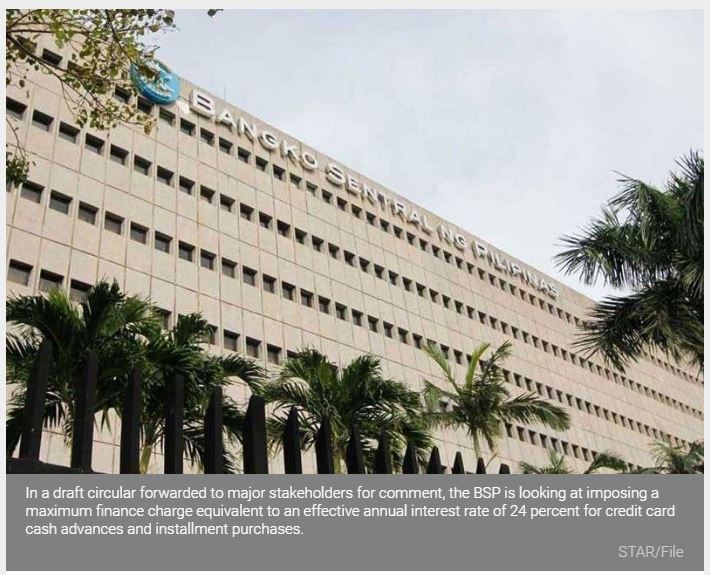Philippines: BSP eyes cap on credit card loan rates
MANILA, Philippines — The Bangko Sentral ng Pilipinas (BSP) plans to put a cap on the finance charges imposed by banks and financial institutions on credit card loans to help ease the burden of consumers amid the COVID-19 pandemic.
In a draft circular forwarded to major stakeholders for comment, the BSP is looking at imposing a maximum finance charge equivalent to an effective annual interest rate of 24 percent for credit card cash advances and installment purchases.
The BSP said the ceiling on finance charges should be subject to a review every six months.
Interest or finance charges are imposed on the unpaid outstanding balance as of cut-off date each time a cardholder pays less than, or does not pay on time, the outstanding balance stated in his/her statement of account.
These charges are imposed until the outstanding balance and applicable interest are fully paid.
For credit card cash advances, a cardholder may be charged cash advance fees and finance charge on the date that the cash is obtained, subject to terms and conditions under the credit card agreement.
For a loan where the principal is payable in installments, interest per installment period is calculated based on the outstanding balance of the loan at the beginning of each installment period.
Under the proposed amendment to the Manual of Regulations for Banks (MORB), banks should only charge interest or finance charges arising from the non-payment in full or on time of the outstanding balance based on the unpaid amount of the outstanding balance as of statement cut-off date.
The BSP also plans to amend the Manual of Regulations for Non-Bank Financial Institutions (MORNBFI) to put a maximum finance charge of 24 percent per annum for credit card issuers.
Likewise, Section 305 of the MORB and 304-Q of the MORNBFI will also be amended to state that “the rate of interest, including commissions, premiums, fees and other charges, on any loan, or forbearance of any money, goods or credits regardless of maturity and whether secured or unsecured, shall not be subject to any regulatory ceiling, except for finance charges imposed on credit card receivables.”
Despite aggressive monetary easing by the BSP, including the cumulative 175 basis points cuts in interest rates, credit growth slowed down for the third straight month to a single-digit 9.6 percent in June due to the impact of the pandemic.
This was the slowest growth for bank lending since the 9.3 percent expansion recorded in October last year.
Preliminary data from the central bank showed loan disbursements of big banks amounted to P9.28 trillion as of end-June, or about P817 billion higher than the P8.47 trillion released as of end-June last year.
Credit card loans jumped by 28.4 percent to P410.4 billion as of end-June from P319.64 billion at the end-June last year.
Republic Act 11469 or the Bayanihan to Heal as One Act barred banks, credit card issuers, and other financial institutions from charging interest on fees and charges during the lockdown. The law lapsed last June 5.
However, the Bayanihan to Recover as One (Bayanihan 2) bill, which was approved by the House of Representatives and the Senate last week, calls for a 60-day debt moratorium.
Source: https://www.philstar.com/business/2020/08/24/2037340/bsp-eyes-cap-credit-card-loan-rates


 Thailand
Thailand




